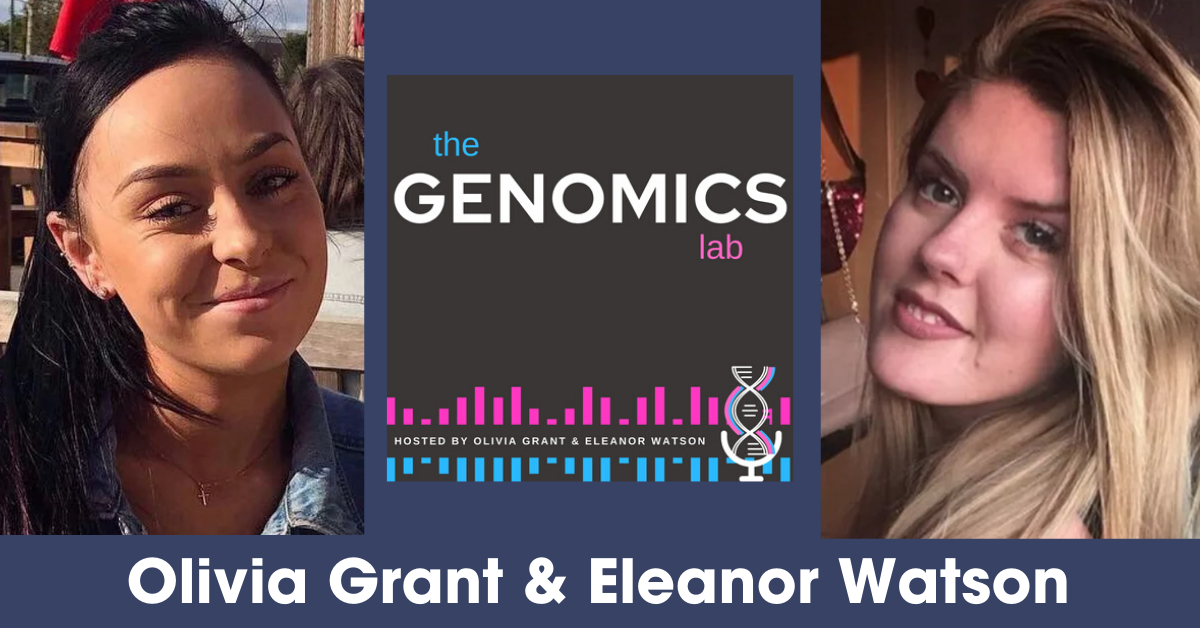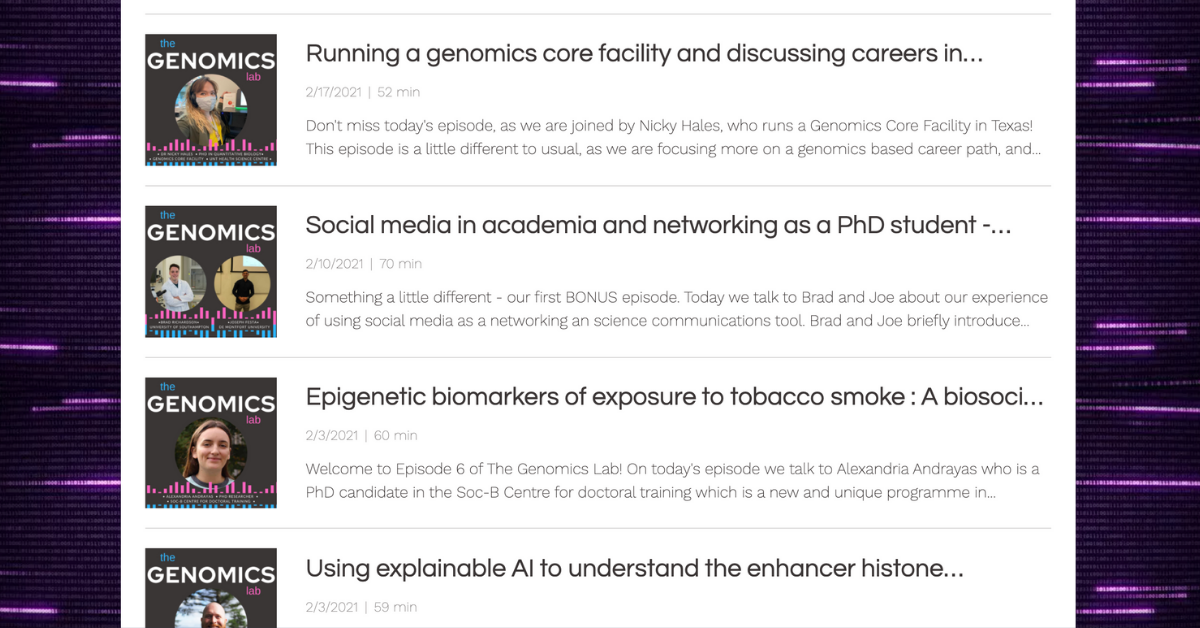Podcasts by Scientists: The Genomics Lab
In the first of our brand new Podcasts by Scientists series, we shine the spotlight on The Genomics Lab podcast! This fantastic interview series was created by Olivia Grant and Eleanor Watson who are both PhD candidates in the Genomics research group at the University of Essex. The podcast was launched in January 2021, with each episode featuring interviews with researchers in the field of genomics who discuss their current papers, their research techniques, the latest breakthroughs in the field, and more.
We spoke to Olivia and Eleanor to find out more about the podcast and how it came about.
First of all, can you tell us a little bit about your background as scientists?
Olivia: I’m probably in the earliest possible stages of my career as a scientist! I graduated in 2019 with a first class honours BSc in Biomedicine from the University of Essex, and during my final year, I completed my dissertation project completing bioinformatics analysis. This initiated my interest for using computer systems to answer biologically relevant questions, which led me to pursue my PhD. I am currently based in the genomics group at the University of Essex and I am on a two-year contract as a visiting student at Queen Mary UOL.
Eleanor: I’m also a very early stage scientist, having only achieved my BSc in Biomedical Sciences from the University of Southampton in 2018, and then completing my MSc at London School of Hygiene and Tropical Medicine, in Reproductive and Sexual Health Research. It was my final year of my BSc and my master’s year that really sparked my interest in my current area – fertility research. I am currently in my second year of my PhD at the University of Essex, studying the genomics and morphometrics of human fertility.
How did the podcast come about?
Olivia: We met in the first week of our PhD at Essex and quickly became great friends and colleagues. As the pandemic progressed, we routinely updated each other on our research progress and attended online seminars together. We discussed how we found it hard to keep up with the literature in our niche, never mind other areas in genomics. One day I suggested we start a podcast as a way of meeting other scientists in genomics and finding out more about their research. It seemed a great alternative for us (and for our listeners) to trying to find time to read research papers. One of the best things about it, is that we can actually ask all of those questions that arise when you are reading a research paper, because we're talking directly to the authors of those papers! We can also get them to explain those basic concepts before delving into the details of their work, meaning we are able to better understand their research.
Eleanor: Livy loves podcasts and I was keen to do something a little different, so we decided a podcast that could help keep up to date with the relevant literature would be a great idea. What was the best thing – in our opinion – is that it filled a void that was left by the pandemic, where we were unable to travel to conferences and hear about all sorts of novel research from all over the globe. Our podcast allowed us to approach people from all over the world and hear about their research, as well as providing them with a platform to share their latest papers.
Who is the podcast aimed at?
Olivia: The podcast is aimed at anyone interested in learning more about genomics, from those at undergraduate level right through to professor level. We start off slow and build a basic understanding of the difficult concepts before we start discussing things in more detail.
Eleanor: We have been really mindful of it being accessible for everyone, ensuring it’s understandable for more early stage researchers and/or undergraduates, as well as thorough and stimulating enough for experts in the field.
Which has been your favourite episode so far?
Olivia: For me it has to be our episode on epigenetic biomarkers of tobacco smoke exposure. It is very similar to my own research so I thoroughly enjoyed the discussion!
Eleanor: My favourite episode was with Professor Darren Griffin, a world expert in my field of fertility. Darren is so inspiring and interesting, with so many talents in science communication, so many interesting projects, from books to TV shows, and his research is just so fascinating.
What topics do you have planned for future episodes?
Eleanor: We try our hardest to cover all areas of genomics. What’s been fab up to this point is the fact that either Livy or I have some expertise or knowledge in each of the areas we've covered, meaning one of us is able to lead the conversation, while the other asks the questions more for the lay audience. However, what will be more of a challenge is when neither of us know much about an area! For example, this week we are speaking to someone about mitochondria, an area neither of us are familiar with. We are also both really keen to highlight some DNA damage research.
If you could interview absolutely anybody, who would be your dream podcast guest?
Olivia: My dream guest would probably be David Sinclair. I think his science communication is fabulous and his research is so interesting. Not to mention his book, Lifespan, which is also amazing!
Eleanor: I’m lucky enough to have had my dream guest already, with Professor Darren Griffin. However, for the future, I have an enormous list of guests I’d love to speak to. We have an ever-growing spreadsheet with all the fascinating experts we come across, and I am hopeful we will be able to interview all of them one day.
What are your plans for the podcast long-term?
Eleanor: I think we have to prioritise our PhDs for the time being, but we have both decided we would really love this to be a large component of our career one day. For the time being we are just loving creating content for the episodes and it doesn’t at all seem like a chore.
Olivia: I agree… I think for the moment, we are both just really enjoying it and aren’t putting too much pressure on the long term plans.
Eleanor: It’s important for us to keep sight of this love for the podcast and then one day when we have some more time on our hands we will be able to up the frequency of episodes. We joke about being world famous podcasters one day, but I think deep down we would both love that…..
What advice would you give to other scientists who are keen to get into podcasting?
Eleanor: I would say, first and foremost, make sure you love what you discuss!! A lot of work goes into researching guests, recording the podcasts, and of course editing them – so you want to be talking about things you really enjoy. Batch-record the first 4 or 5 episodes so on your first release date you have plenty of content to release to the public.
Olivia: Definitely find your niche and have a clear plan for what you want your podcast to be about. If you want to discuss ALL things science, that is great but if you want to discuss only epigenetics for example, that’s also OK! Make sure this is reflected in your podcast name too so that people know what to expect! Also, use platforms like Canva to make great cover art, and Anchor for easy distribution of your podcasts.
Aside from The Genomics Lab, which other science-themed podcasts would you recommend?
Olivia: I enjoy listening to the Epigenetics Podcast by Active Motif.
Eleanor: I try to keep up with The Lonely Pipette by Jonathan Weitzman & Renaud Pourpre.
How can our readers listen to the podcast?
The podcast is available on all major podcast platforms including Spotify, Apple, Google and more! You can find more information here.
___________________________________________
If you're interested in finding out more about The Genomics Lab podcast, here’s how:
- Follow them on Twitter: @theGenomicsLab
- Follow them on Instagram: @theGenomicsLab
___________________________________________
If you enjoyed this article, why not check out the other resources available on our blog. We are passionate about supporting life scientists, early career life scientists and PhD students - with really low- priced reagents and biochemicals, early career scientist grants, and resources to help with both personal and professional development. We know how tough it is - so we hope you find these helpful!
Advice & guidance for life scientists
Click below to view our essential guides and articles to support life scientists, PhD students & early career life scientists:
Wellbeing for scientists
Click below for our resources to help improve your wellbeing:
Technical resources
Try our Molarity Calculator: a quick and easy way to calculate the mass, volume or concentration required for making a solution.
Try our Dilution Calculator: an easy way to work out how to dilute stock solutions of known concentrations
And - when you get to the stage of planning your experiments, don't forget that we offer a range of agonists, antagonists, inhibitors, activators, antibodies and fluorescent tools at up to half the price of other suppliers - click below to see how we compare with other suppliers:





















